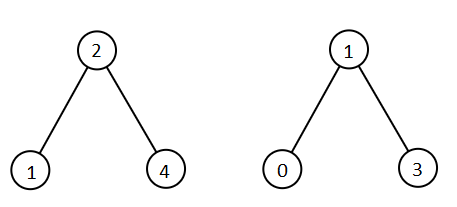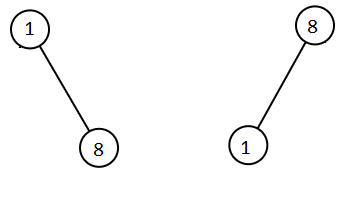Given two binary search trees root1 and root2.
Return a list containing all the integers from both trees sorted in ascending order.
Example 1:
Input: root1 = [2,1,4], root2 = [1,0,3] Output: [0,1,1,2,3,4]Example 2:
Input: root1 = [0,-10,10], root2 = [5,1,7,0,2] Output: [-10,0,0,1,2,5,7,10]Example 3:
Input: root1 = [], root2 = [5,1,7,0,2] Output: [0,1,2,5,7]Example 4:
Input: root1 = [0,-10,10], root2 = [] Output: [-10,0,10]Example 5:
Input: root1 = [1,null,8], root2 = [8,1] Output: [1,1,8,8]
Constraints:
- Each tree has at most
5000nodes. - Each node's value is between
[-10^5, 10^5].
两棵二叉搜索树中的所有元素。题目就是题意,题目给的是两棵二叉搜索树,请你返回的是一个有序的list,里面包含了来自两棵树的所有元素。
这道题的思路就是二叉树的中序遍历94题 + merge two lists 21题。因为input给的是二叉搜索树所以最好是用中序遍历。
时间O(n)
空间O(n)
Java实现
1 /** 2 * Definition for a binary tree node. 3 * public class TreeNode { 4 * int val; 5 * TreeNode left; 6 * TreeNode right; 7 * TreeNode() {} 8 * TreeNode(int val) { this.val = val; } 9 * TreeNode(int val, TreeNode left, TreeNode right) { 10 * this.val = val; 11 * this.left = left; 12 * this.right = right; 13 * } 14 * } 15 */ 16 class Solution { 17 public List<Integer> getAllElements(TreeNode root1, TreeNode root2) { 18 List<Integer> list1 = new ArrayList<>(); 19 inorder(root1, list1); 20 List<Integer> list2 = new ArrayList<>(); 21 inorder(root2, list2); 22 return merge(list1, list2); 23 } 24 25 private void inorder(TreeNode root, List<Integer> list) { 26 if (root == null) { 27 return; 28 } 29 inorder(root.left, list); 30 list.add(root.val); 31 inorder(root.right, list); 32 } 33 34 private List<Integer> merge(List<Integer> list1, List<Integer> list2) { 35 List<Integer> res = new ArrayList<>(); 36 int i = 0; 37 int j = 0; 38 while (i < list1.size() && j < list2.size()) { 39 if (list1.get(i) < list2.get(j)) { 40 res.add(list1.get(i)); 41 i++; 42 } else { 43 res.add(list2.get(j)); 44 j++; 45 } 46 } 47 while (i < list1.size()) { 48 res.add(list1.get(i)); 49 i++; 50 } 51 while (j < list2.size()) { 52 res.add(list2.get(j)); 53 j++; 54 } 55 return res; 56 } 57 }

